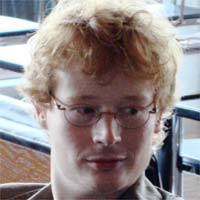Workshop on QUANTUM INFORMATION PROCESSING AND QUANTUM COMMUNICATIONS
Miniworkshop on Quantum Foils
Is quantum theory special?
>VITAE:
Jonathan Barrett completed his PhD in Theoretical Physics at the University
of Cambridge in 2002. He then held postdoctoral positions at the Université
Libre de Bruxelles, Belgium, and at Perimeter Institute, Canada. Since
November 2007, he has been back in Cambridge as an HP Research Fellow.
He has worked on various aspects of quantum information theory, including
quantum entanglement, nonlocality, and quantum key distribution. He also
works on the foundations of quantum theory, and is currently co-editing
a book on the Everett interpretation.

Is there any reason why the universe should obey the laws of quantum theory, as opposed to any other possible theory? Is quantum theory special in any way? The best way to address these questions is to view quantum theory as just one point in an entire space of possible theories, and to compare and contrast quantum theory with its rivals. As the success of quantum information theory makes clear, one means by which different theories may be compared and contrasted is via their information processing capabilities. To this end, following early work of Mackey, Ludwig and others, I show how to write down essentially arbitrary probabilistic models, based on the conditions that state spaces are convex and that separated systems cannot be used for instantaneous signalling. Both the classical and quantum theories are special cases. With a focus on information processing, I then describe (i) some features of quantum theory that one might have expected to be uniquely quantum, but turn out to be highly generic, and (ii) some features that do mark quantum theory as special.